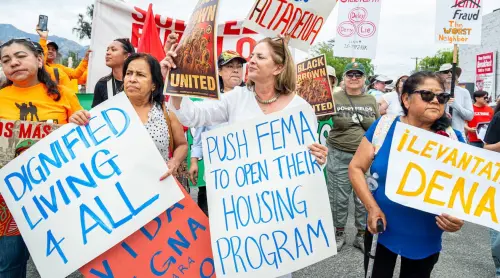In recent weeks, both Vice President Kamala Harris and former President Donald Trump have announced proposals to exempt tips from federal taxes, much to the chagrin of economists across the ideological spectrum.
The obvious problem is that the proposals are inconsistent with sound tax policy. The less obvious problem is that exempting tips would not even help the vast majority of low-income workers. Still, the proposal opens the door for discussing better ways to organize taxes and help low-income workers, such as expanding the Earned Income Tax Credit (EITC) and the Child Tax Credit (CTC).
The proposals
Harris would exempt tips from income tax but not payroll taxes—the contributions that people make to Social Security and Medicare. Her proposal would allow workers in the service and hospitality industries with income below $75,000 to claim exemptions up to a (currently unspecified) capped amount.
Trump has offered scant details. It appears that his proposal would not limit the tax break by sector or income level. This would match two recently introduced bills, one by Senator Ted Cruz (R-TX) and Representative Byron Donalds (R-FL) and the other by Representatives Thomas Massie (R-KY) and Matt Gaetz (R-FL). But it is unclear whether Trump would exempt tips from payroll taxes. The Cruz-Donalds proposal would apply only to the income tax, while Massie-Gaetz would apply to payroll taxes as well.
Better ways to help low-income workers
Both camps see their proposals as a way to improve the economic standing of low-wage workers.
We agree that this is an important goal, but there are much better ways to achieve it. Only 5% of workers in the bottom earnings quartile earn tips and could possibly benefit from the proposal. Even among tipped workers, 37% earn so little that they pay no federal income tax and so would not benefit from the tax cut.
Additionally, it may not be workers who gain from such a policy. Employers might simply cut workers’ base pay, pocketing the would-be gains for themselves. Business owners could attempt to reclassify employees as tipped workers under the guise of a tax break, only to then also drop their pay to the lower tipped minimum wage (currently $2.13 per hour federally, compared to $7.25 per hour for non-tipped workers).
Lastly, exempting tips from taxation risks depriving workers of several federal benefits. For instance, if the Trump proposal in fact shields tips from payroll taxes, then workers—perhaps unknowingly—would receive reduced retirement benefits, which are based on total career contributions to Social Security and Medicare. Similarly, the EITC phases in for low-income workers, meaning that, if a family earning tipped wages has their taxable income drop below a certain threshold, they will lose benefits, potentially even more than the corresponding tax cut. The Center for American Progress, in reviewing Cruz’s plan, finds that savings might also be fully offset by lower CTC benefits for many families.
Exempting tips from taxation does nothing to help most low-income workers, and it may do little for many tipped workers—or even actively harm them. This means that candidates would be better off focusing their efforts on policies which would benefit all low-wage workers. This could include an increase in the minimum wage, as Harris has already announced, or potentially closing (or even eliminating) the gap between the minimum and tipped minimum wages. It could also include expanding the CTC and EITC, both of which Harris has proposed. Although vice-presidential nominee JD Vance has proposed his own version of an expended CTC, the Heritage Foundation’s Project 2025 calls for eliminating “most deductions, credits, and exclusions.” Ultimately, if the two candidates want to flex their commitment to lifting low-wage workers, there are numerous sound ways to do so—but exempting tips from tax isn’t the answer.
Distortionary tax policy
Moreover, regardless of the specifics, the proposals make for distortionary tax policy.
A carveout for tips violates the basic principle of equity, a cornerstone of sound tax policy. Exempting income earned as tips for a waitress, but not wages earned by a teacher, ensures that two taxpayers with the same level of income would pay markedly different amounts of tax. On top of this, it is somewhat ironic that tipped workers have been singled out for tax relief given their already-high rate of tax evasion. And the proposals could make state tax collections more complex.
Moreover, introducing an exemption for tips creates a slippery slope for future tax avoidance. Giving one type of income preferential treatment automatically creates an incentive for taxpayers to find ways to label their income that way. Under the Trump proposal, for example, what is to stop lawyers from slashing their rates and allowing clients to pay them a large, tax-free tip for their services? Also, enacting the proposal would open the door for others to seek relief for their particular form of income, such as the bonuses or commissions that hedge fund managers and investment bankers earn. Although the Harris campaign has at least attempted to limit these outcomes through its proposed guardrails, this would only serve to complicate a tax system already mired in a dizzying array of exemptions, all while the IRS has limited resources to shut down loopholes for wealthy tax cheats as it is. It would be far simpler—and fairer and less risky—to simply continue to tax tips as normal income.
Lastly, the U.S. continues to face a long-term debt problem. According to recent analyses from Committee for a Responsible Federal Budget (CRFB), the Trump plan would cost between $150-200 billion over the next decade, while Harris’s plan would cost a little less than half of that, due to her proposed targeting. However, when combined with a concurrent proposal to raise the minimum wage, CRFB estimates that Harris’s plan would still cost $100-200 billion. Furthermore, these estimates assume that there is no behavioral response to the new policy. If workers instead shift a higher portion of their income into tipped wages, then the costs of these proposals could quickly balloon to as much as $325 billion for Harris and $500 billion for Trump.
If the candidates want to help low wage workers, they should be direct in their approach. A “no taxes on tips” approach will not do the trick, and the distortions in the tax system outweigh the few benefits it might provide.
-
Acknowledgements and disclosures
The Brookings Institution is financed through the support of a diverse array of foundations, corporations, governments, individuals, as well as an endowment. A list of donors can be found in our annual reports published online here. The findings, interpretations, and conclusions in this report are solely those of its author(s) and are not influenced by any donation.
The Brookings Institution is committed to quality, independence, and impact.
We are supported by a diverse array of funders. In line with our values and policies, each Brookings publication represents the sole views of its author(s).





Commentary
Op-edNo tax on tips: An answer in search of a question
September 17, 2024